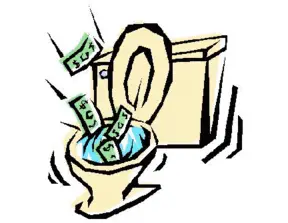Open Letter to TAX PAYERS FOR COMMON SENSE
 |
Confronting anti-ethanol claims that make no sense
By Marc J. Rauch
Exec. Vice President/Co-Publisher
THE AUTO CHANNEL
To Ryan Alexander and Associates
 Marc J. Rauch |
Eliminating needless taxes and wasteful spending is very much needed. If you're truly engaged in this, and if you've actually been able to eliminate such onerous impositions, I commend and thank you.
However, it would seem to me that if you hired triple the staff and spent your time on just eliminating subsidies, allowances, tax credits and other financial considerations given to the petroleum oil industry that that would, and should, fill your entire day.
With this in mind, I'm wondering why you are spending so much time on castigating ethanol? You claim that the ethanol industry has benefited from over 40 years of government assistance. Let's say that it's an accurate claim, so what? How does that compare to the more than 150 years of vast government support of the oil industry, an industry that produces poison? You call the ethanol industry "mature," and say that it should stand on its own. Surely you do so in jest. "Mature" is what the oil industry is. If any industry is mature and should stand on its own, it's the oil industry. They should be providing their own security instead of using the U.S. Military as if it's a private security force.
Moreover, if the 40+ years of assistance to the ethanol industry is correct, perhaps it's deserved considering the more than 60 years in which the government intentionally obstructed the ethanol industry to the benefit of the petroleum oil industry.
This aside, regardless of whether the ethanol industry is owed the assistance or not, I don't see how it excuses your organization from disseminating lies and gross exaggerations about ethanol. For example, in your editorial "More Salt In Taxpayers Wounds" (https://www.taxpayer.net/energy-natural-resources/more-salt-in-taxpayers-wounds/), you write: "E15 is incompatible with older vehicles and lawnmowers, chainsaws, and boat engines used this time of year." This is incorrect. It's not partially incorrect; it's not somewhat incorrect; it's totally false. Who ever provided this information to you either lied to you or didn't know what they are talking about.
In case you don't know, virtually all land and water vehicles sold and used in America are sold and used in Brazil, where the standard "gasolina" is E27. E27 contains nearly twice the amount of ethanol as contained in E15. The same is true of small engine equipment like lawn mowers and chainsaws. Brazil has mandated E15 and higher blends since 1978. If a Chevy Camaro, or Mercury Motors outboard engine, or Husqvarna lawnmower can operate safely and efficiently in Brazil on E27, it can operate safely and efficiently run in America on E15. If a 1984 Chevy Camaro could operate safely and efficiently on the streets of Sao Paulo with E27, then it can operate safely and efficiently on any street in America using E15 and higher. By the way, Brazil will be elevating to E40 in the next few years.
In addition, from the 1920's through the 1970's, ethanol-gasoline blends up to E30 were widely marketed in Great Britain and other European countries (there was even a period of time in which Spain outlawed all use of gasoline). The ethanol-gasoline blends were marketed as being safer, cleaner, more powerful, and less expensive than any gasoline without ethanol - and it was sold by the world's biggest oil/gasoline companies (Standard, Esso, Cities Service). This means that all the great old cars of Europe (Rolls Royce, Bentley, Astin-Martin, Austin Healey, MG, Triumph, Jaguar, Mercedes, BMW, VW, Fiat, Renault, Volvo, Saab, Audi, and many others) were completely capable of operating safely and efficiently on ethanol-gasoline blends. So what older vehicles are you referring to?
As it happens, ethanol is compatible with more types of rubbers, plastics, and metals than gasoline, aromatics (benzene, toluene, xylene), tetraethyl lead, and ethylene bromide. Ethanol doesn't damage engines, it cleans engines.
Your editorial states, "Most ethanol is derived from corn, so future E15 expansion will likely be met with corn ethanol." So what? You make this statement like its a bad thing, but it's not. In any event, there's no reason to believe that future ethanol use (especially much higher use, such as a mandated E50 and above) means that it will be met with ethanol produced from corn. Anyone who has spent more than 15 minutes researching this issue knows that there are many crops and raw materials that yield equal or far better annual results per acre. Did anyone in your organization spend more that 15 minutes researching the issue? It doesn't seem so.
Your editorial states, "...experts have questioned whether corn ethanol reduces greenhouse gas emissions." Experts? Humbug! You mean people paid by the oil industry to create lies just as they did for the tobacco industry. Ethanol burns much cleaner than gasoline. Ethanol produces extremely little particulates; gasoline is filthy. This is proven by the simplest of practical visual demonstrations. And, a long string of studies that show ethanol-gasoline fuels to be much cleaner than ethanol-free gasoline. The latest studies confirming this comes from North Carolina State University (NCSU), the University of California Riverside (UCR), and the United States Department of Agriculture (USDA):
https://fixourfuel.com/wp-content/uploads/2018/04/NCSU-Study.pdf
https://fixourfuel.com/wp-content/uploads/2018/04/UC-Riverside-Study.pdf
https://www.tandfonline.com/doi/full/10.1080/17597269.2018.1546488
While it has again become fashionable for ignoramuses masquerading as fuel/energy experts to claim that ethanol is not clean because its production may utilize filthy petroleum oil fuels somewhere along the production-distribution process, they conveniently ignore all the ancillary and extraneous uses of the filthy petroleum oil fuels that are required to produce, ship, refine, and protect the filthy petroleum oil fuels and the entire the oil industry.
Lastly, there is no open and free market for fuels; it is controlled completely by the oil industry and it's paid politicians.
If you care to learn the real facts about ethanol, I recommend my 641-page book, "THE ETHANOL PAPERS." It is available to be read for free by CLICKING HERE. You entire staff should make use of it because it won't be the last time that you hear from me.
Thanks for your time.


